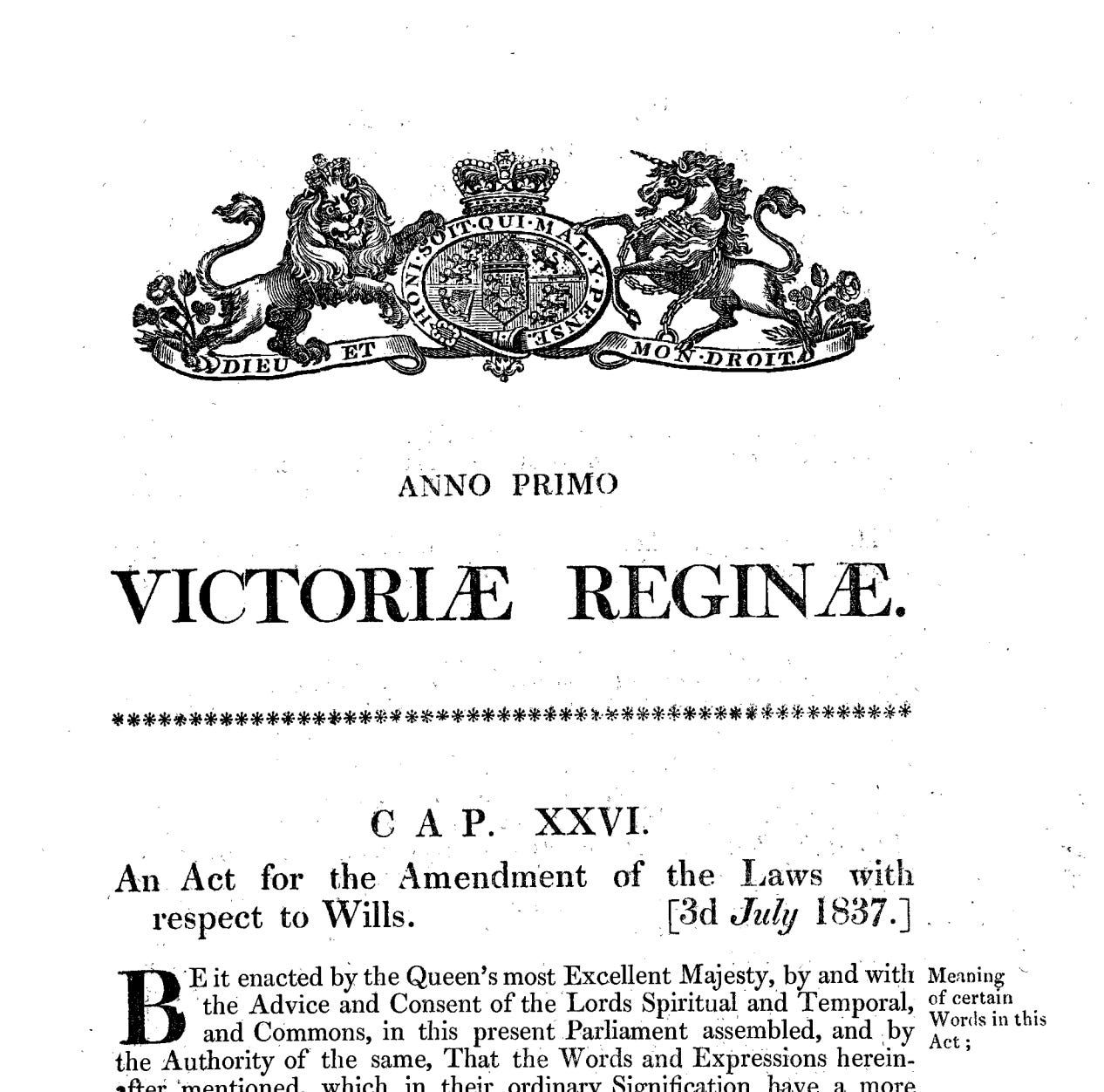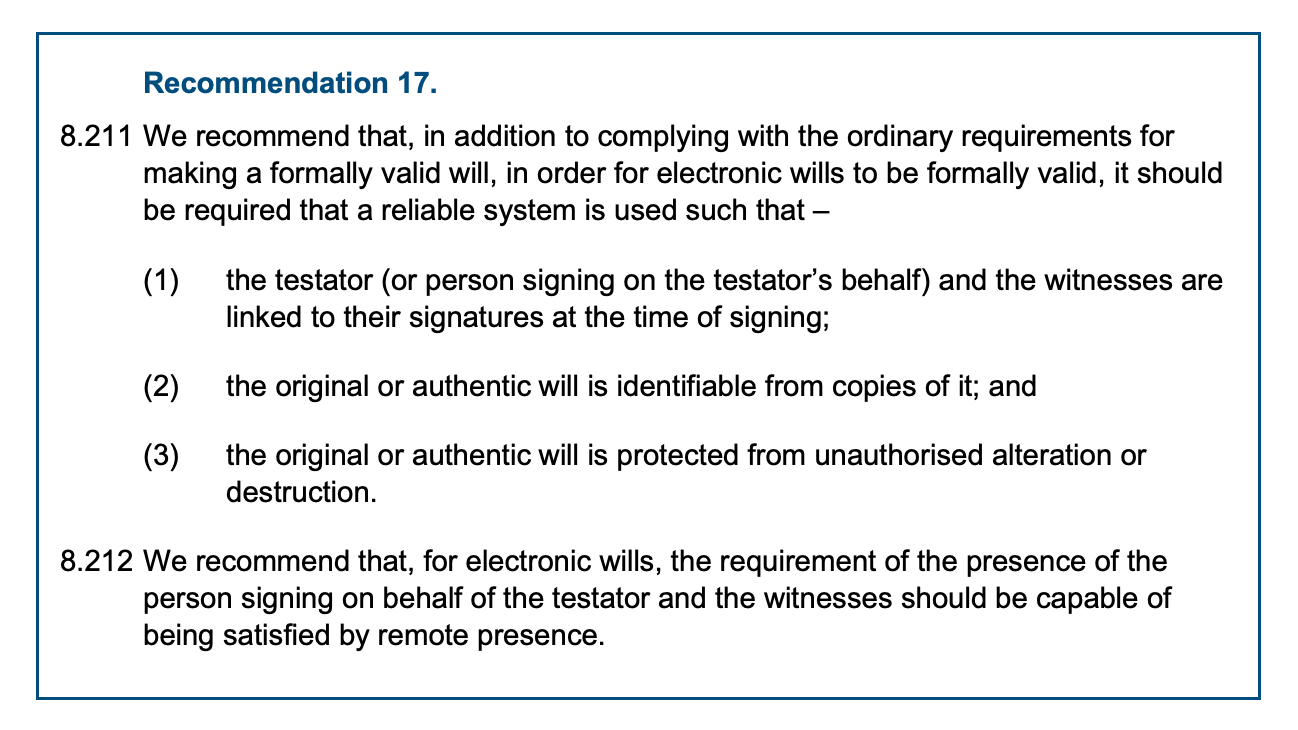Electronic Wills: A Law Commission Reform
Newsletter Issue 26 (Law Reform): Electronic wills could soon become a legal reality, making it easier to write and store your will securely online without physical paper or in-person witnesses.
Most people still write their wills on paper, but that could be about to change. The Law Commission has proposed making electronic wills legal in England and Wales. This reform could make will-making faster, easier and more secure for everyone.
A Will for the Digital Age
Making a will is one of the most important things a person can do to ensure their property and wishes are respected after they pass away. For many years, doing so has required paper, pen, and two witnesses physically present to sign off.
That is now changing.
The England and Wales Law Commission has proposed reforms to bring the law of wills into the digital era.
The current law on wills is nearly 200 years old. It was created in a time before emails, video calls, or digital storage. Yet these tools are now part of everyday life.
The Law Commission has said it is time for the law to reflect how people actually live. A will written on paper and stored in a drawer no longer makes sense for everyone.
Electronic wills could allow people to make their wills using computers or smartphones, and store them securely online. The aim is not to lower standards, but to update them. An electronic will should be functionally equivalent to a paper will.
The Law Commission has been clear that any digital system must still protect people from fraud, mistakes, or pressure. Security, reliability, and proof of intention are just as important online as they are on paper.
There are also wider benefits. Making wills more accessible could help younger people and those who find traditional processes difficult. It could also reduce the number of people who die without any will in place; a situation that can cause confusion and conflict in probate.
The Law Commission has suggested that electronic wills should be allowed, but only under a carefully regulated system. This would include strict technical standards and new rules for how wills are signed and witnessed digitally.
These reforms matter because wills affect everyone. Whether someone has a lot or a little, the law should make it easier to plan for the future, not harder.
What Is an Electronic Will?
An electronic will is a will that is created and stored in digital form rather than on paper. It is a type of will that could be written, signed, and witnessed using electronic means, such as on a computer or tablet, and stored as a digital file.
Under current law in England and Wales, wills must be in writing and signed in the physical presence of two witnesses. This means that even a fully typed and digitally signed will does not count unless printed and witnessed in person.
The Law Commission has recommended a change.
It proposes that electronic wills should be legally recognised in the future, but only if they meet regulated safeguards. The Law Commission’s position is that the format of a will should not matter, as long as the person’s wishes are clearly expressed and the process is secure 🔒.
An electronic will would need to meet the same basic requirements as a paper will. The person making the will must be of sound mind, must sign the will intending it to take effect, and must have it witnessed.
The difference is that electronic systems would be allowed to handle the signing and witnessing process remotely, through a secure and reliable method that proves identity, preserves the content, and prevents tampering.
Why Now? The Case for Reform
The Law Commission's recommendation to reform the law of wills is grounded in the recognition that social and technological practices have changed.
During the COVID-19 pandemic, people increasingly relied on remote communication tools to connect with others and manage everyday tasks. This included how legal documents, including wills, were created and signed.
In response to these circumstances, the government introduced a temporary measure to allow video witnessing of wills. This change, although limited in scope and duration, marked a significant departure from the traditional requirement for witnesses to be physically present. It revealed that the law could adapt in ways that preserved core protections while meeting modern needs.
Beyond the pandemic, there has been widespread adoption of electronic communication and digital document handling. These methods are used in everything from banking to healthcare.
However, the law governing wills is still governed by the Wills Act 1837, a statute written in an age of paper and ink. The gap between daily practice and legal requirements has widened.
The Law Commission has also noted growing support for electronic signatures and secure digital storage across various sectors.
The ability to make a will electronically can help people who may struggle with physical paperwork or who do not have easy access to legal services in person. It can also reduce delays and encourage more people to formalise their wishes while still mentally capable.
Another factor is the rise in concerns about legal certainty and fraud prevention in the digital environment. Rather than avoiding digital systems, the Law Commission proposes that reforms include safeguards such as identity verification, reliable audit trails, and tamper-proof records 🔐.
What Will Count as ‘Valid’?
For an electronic will to be legally valid, it must follow specific rules. A digital document on its own will not qualify unless the law recognises it as a proper will.
The Law Commission has recommended changes that would allow electronic wills under certain conditions. These recommendations are not yet law, but they are intended to make the law clearer and more practical for modern users.
The proposed changes will ensure that electronic wills meet the same core legal standards as paper wills. This means a will must be made voluntarily, by someone with mental capacity, and with clear intention to dispose of their property after death. In addition, the will must be signed and witnessed properly.
For electronic wills, the signature process may be different. The Law Commission recommends that people should be able to sign electronically. Witnesses should also be allowed to witness the signing remotely, for example, using video call platforms.
However, the law will still require safeguards. These include using a secure and reliable system that confirms the identity of the person making the will and protects the contents from being altered later without permission.
A digital will must also be stored in a way that proves it is the original version (perhaps storing it on a blockchain? 🤔). This means it should not be easy to change, delete, or copy without clear records. The aim is to prevent fraud and make it easier for courts to accept the will as valid when someone dies.
The Law Commission proposes that the Secretary of State should be given powers to create detailed regulations. These would cover how electronic signatures, secure storage, and remote witnessing should be handled in practice. That way, the rules can keep up with changes in technology without needing a new Act of Parliament every time something is revised.
Tech Meets Tradition: Witnessing Wills by Video
During the pandemic, an emergency change to the law of wills allowed people to witness wills over video link. This temporary measure ran from January 2020 to January 2024. It was introduced because lockdowns made it difficult for people to have two witnesses physically present, as required under the Wills Act 1837.
The Law Commission has now recommended that this approach should be allowed in the long term. Under the proposed reform, people would be able to witness the signing of a will remotely using video conferencing platforms like Zoom or Microsoft Teams, as long as clear conditions are met. The witness must still be able to see the person sign the will in real time. It must be live, not a recording.
This proposal is part of an effort to update the law on wills to reflect how people now communicate and handle documents. It is not a complete departure from the current process. Instead, it adapts the rules to allow the use of technology where necessary and appropriate.
The Law Commission has also recommended that strict standards apply to remote witnessing to ensure that the process is safe and reliable. These include having a secure system in place to verify the identities of those involved and to confirm that the signature being witnessed is genuine.
There are also proposals to record and store the witnessing process, which could help resolve disputes or doubts in the future.
This reform is aimed at making it easier for people to make valid wills while still protecting them from fraud, coercion, or mistakes. The recommendation recognises that, for some people, physical presence is not always practical. It also ensures that digital processes remain aligned with legal safeguards.
What This Means for You
The proposed changes to allow electronic wills are designed to improve access to will-making while maintaining essential legal safeguards. These reforms are relevant to anyone who wants to plan how their property and possessions should be handled after they pass away.
Making a will helps ensure that personal wishes are respected. It allows individuals to decide who inherits their property, how it is distributed, and who should look after dependents or carry out the instructions in the will. Without a valid will, the law decides who gets what. This can lead to outcomes that do not reflect the person’s true intentions.
The Law Commission's proposal to modernise wills law means people will be able to create, sign and store their wills electronically. This can benefit a wide range of people:
📱 Those who are more comfortable using digital tools and want a more flexible, paper-free way of recording their decisions.
👵 Older adults who may have mobility or health limitations that make traditional in-person witnessing difficult.
🧑💻 People with busy schedules who find it more convenient to complete formal tasks online.
The proposed reform still requires important safeguards. Electronic wills would need to be created and signed using secure digital systems that confirm identity, link signatures, and protect the document from being changed.
The goal is to reduce errors, prevent fraud, and support confidence in the will-making process.
These changes do not remove the option to write a paper will. They simply add an alternative.
This is important because some people may prefer or need to use the traditional method, especially if they are unfamiliar with technology or want legal advice face to face.
Key protections remain:
Wills must still be made voluntarily.
The person making the will must have mental capacity.
Witnessing requirements will remain, although presence could include remote technology.
The reforms are not yet law. A new Wills Act would need to be passed by Parliament. If it is approved, guidance will follow to explain how to make an electronic will properly and securely.








Electronic wills will still need to be signed and witnessed. But the process would use secure digital tools, such as identity verification and encrypted signatures (e.g. DocuSign), to ensure that the will is genuine. The system will still need to clearly show who signed what, when, and how, making it harder to tamper with. The potential to use a blockchain needs to be contemplated.
This reform by adopting electronic wills is not just about replacing paper wills. If someone still wants to write and sign their will the traditional way (with paper of course), that will still be fully allowed under the Wills Act. The idea behind the reform is to give people more options, especially for those who find digital tools more accessible or who cannot easily get to a solicitor’s office or where the witnesses are overseas.